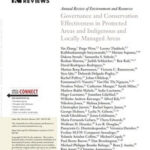Kaisa Korhonen-Kurki, Maria Brockhaus, Bryan Bushley, Andrea Babon, Maria F Gebara, Felicien Kengoum, Thuy Thu Pham, Salla Rantala, Moira Moeliono, Bimo Dwisatrio, Cynthia Maharani. Climate Policy, 14(2), 167–186.
Ever since a global mitigation mechanism that aims to reduce emissions by avoiding deforestation and forest degradation (REDD+) was introduced in climate change negotiations, governance challenges in implementing this concept in tropical forest countries have received considerable attention. In particular, multilevel governance has been identified as a key challenge, as REDD+ aims to tackle local deforestation activities through a global results-based financial scheme. This paper will present an analysis from seven REDD+ countries (Brazil, Cameroon, Indonesia, Nepal, Papua New Guinea, Tanzania and Vietnam) where 293 qualitative interviews were conducted with national-level REDD+ actors. We examined what kind of multilevel coordination problems emerge, particularly in relation to horizontal, cross-sectoral coordination, and analysed these problems through the concepts of functional alignment, institutional complexity and accountability. We argue that there are problems with coordination that have emerged due to failures in recognizing the key multilevel issues. REDD+ is not adequately integrated into existing policies, and there is a gap between REDD+ and sectoral and national development policies. This leads to overlapping regulations and unequal resource allocation among sectors. Our analysis suggests that effective coordination mechanisms for REDD+ should be built on existing mechanisms and experience, include all the stakeholders, ensure the flow of information across the levels and harness the potential of REDD+ itself to overcome multi-sectoral problems. At the national level, there is great awareness of the issues that hinder coordination and effective REDD+ implementation, but this awareness does not seem to be matched by the actions taken to date.

















